Fri, Mar 06, 2026
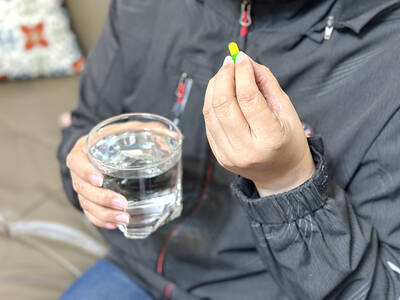
Taiwan is to launch a NT$24 billion (US$757.5 million) pharmaceutical resilience plan to improve the nation’s self-sufficiency in key medicines, President William Lai (賴清德) told a meeting of the Healthy Taiwan Promotion Committee at the Presidential Office in Taipei yesterday.The policy is a respons
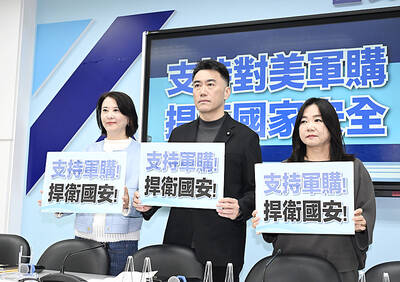
COMPETING BILLS: Premier Cho Jung-tai said the idea that a defense budget could be compiled incrementally was like attempting to build a house without any plans The Chinese Nationalist Party (KMT) caucus yesterday said it would propose a special defense budget bill totaling NT$350 billion (US$11.05 billion) to fund eight weapons sales announced by the US in December last year.The caucus “fully supports” the eight systems listed in US foreign military sales

A bill aimed at enhancing space cooperation between Taiwan and the US cleared the committee stage in the US Senate on Wednesday, with senators saying it would help counter threats from Beijing.The Taiwan and American Space Assistance (TASA) Act is to go to the Senate floor after being passed by the

Iran yesterday launched a new wave of attacks at Israel, US bases and countries across the region, threatening that the US would “bitterly regret” torpedoing an Iranian warship in the Indian Ocean and calling for US President Donald “Trump’s blood,” while Israel said it hit multiple targets in Iran.
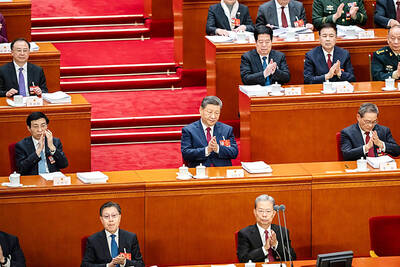
China yesterday announced a 7 percent boost to its defense budget for this year.The latest rise keeps China’s spending at one-third of that of the US, but it is working to close the gap.Beijing plans to spend 1.9096 trillion yuan (US$276.8 billion) on defense, according to a report published at the

TAIWAN QUESTIONS: ’Nobody should get the wrong impression,’ a US defense official said when asked whether the Iran war would embolden adversaries of Taiwan The US is “ahead of the problem” of low munitions amid its war with Iran and the primary focus of the US armed forces is on creating an effective denial defense along the first island chain, US Undersecretary of Defense Elbridge Colby told the US Senate Armed Services Committee on Tuesday when asked

PLANE HIT: The Israeli military said it shot down an Iranian Air Force fighter over Tehran, while an Iranian warship sank off Sri Lanka, with no cause known The US and Israel yesterday hit Iran’s capital and other cities in multiple airstrikes on the fifth day of the war with Iran.Israel targeted the Iranian leadership and security forces, while the Islamic Republic responded with missile barrages and drone attacks on Israel, and across the region.Tehra
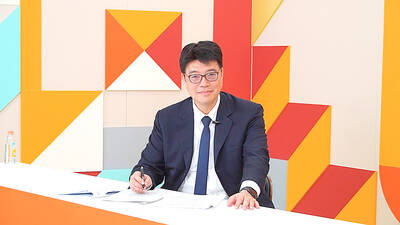
DUAL NATIONALITY? Taiwanese born in China, whose parent is Chinese or who grew up in China are advised to check whether they are registered Chinese citizens The Mainland Affairs Council (MAC) said it would submit evidence to the Central Election Commission (CEC) proving that Taiwan People’s Party Legislator Li Zhenxiu (李貞秀) was not qualified to register as a candidate, which would then determine whether it should file a lawsuit to invalidate her qualifi
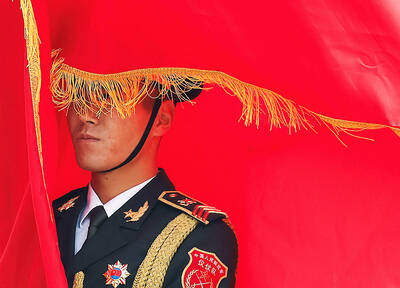
UNEASY LULL: China’s recent purge of military officials and the upcoming Trump-Xi meeting could be the reason for the reduced Chinese air force drills, experts said Chinese air force activity around Taiwan has fallen sharply in the past few weeks, with no flights at all in the past week, a sudden drop in what had been daily military maneuvers that could signal Beijing is recalibrating its pressure on Taipei.China has dispatched 460 military planes — from fighte
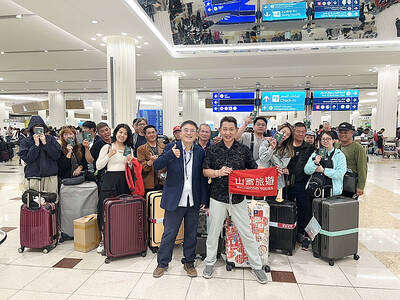
The government yesterday evacuated more than 200 Taiwanese from the Middle East amid ongoing US-Israel strikes on Iran, multiple sources confirmed.The Ministry of Foreign Affairs and the Ministry of Transportation and Communications arranged for their return from Qatar via Emirates Airway, Deputy Mi
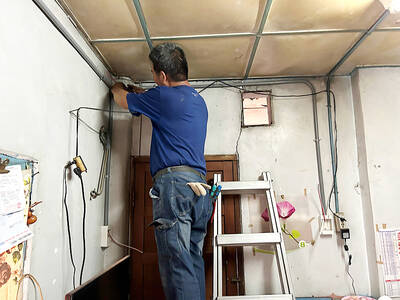
The Executive Yuan has allocated NT$5 billion (US$157.81 million) in subsidies for the renovation of residential buildings 30 years old or older to enhance their security and functionality, National Land Management Agency Director-General Tsai Chang-chan (蔡長展) told a post-Cabinet meeting news confer

EASIER CHOICE: A color code scheme is also planned, which would be placed in the front of food packaging, to help people easily check the items’ salt and sugar content Health officials yesterday announced new dietary guidelines that puts emphasis on eating more fruits and vegetables, as well as a plan to introduce a color code on food packaging to show its sugar and salt content.The new Daily Dietary Guidelines, which would be implemented next month at the earlies
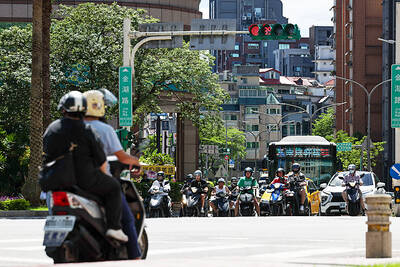
SAFETY REMINDERS: Drivers who do not slow down on roads with curves or during low visibility conditions, or fail to follow yield rules would be required to attend seminars Drivers who repeatedly run through red lights and fail to slow down when approaching pedestrian crossings would be ordered to attend a road traffic safety seminar, according to a new policy announced by the Ministry of Transportation and Communications yesterday. Under the proposed revisions to the
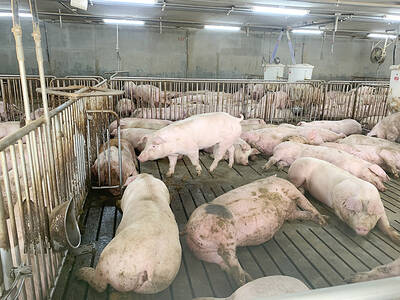
The Ministry of Environment is to collaborate with the public sector and the National Pingtung University of Science and Technology in developing livestock biogas power generation techniques to improve river quality.A research center and biogas power generation facilities would be set up on the univ
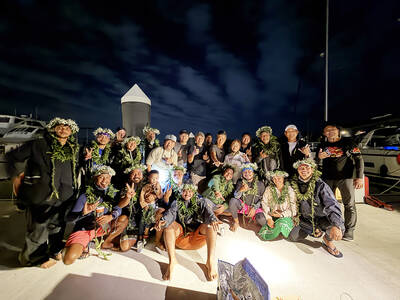
The non-motorized canoe Alingano Maisu sailed more than 10,000km from Palau to Pingtung County’s Dapeng Bay (大鵬灣) and is to sail into the Port of Kaohsiung tomorrow.This is the second time that Maisu, a canoe guided solely by celestial navigation, landed in Taiwan, following a visit in May last year
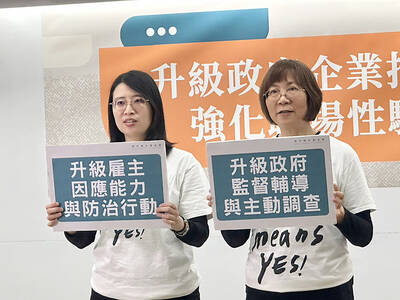
About 46 percent of people feel that company attitudes toward preventing sexual harassment are passive, while 60 percent say that training exercises are not effective, a Modern Women’s Foundation poll released yesterday found.The foundation released the results two years after the passage of amendme
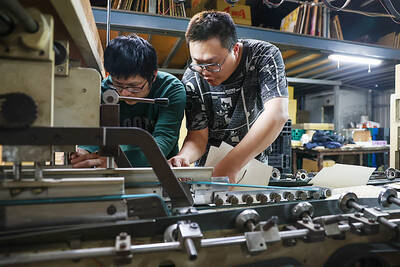
ROOM TO GROW: Industrial production in the first two months of this year could expand up to 22.2 percent, reaching a record high, the economic affairs ministry said The industrial production index expanded 28.51 percent year-on-year in January to 124.51, driven by strong demand for artificial intelligence (AI) and high-performance computing applications, as well as front-loading ahead of the Lunar New Year holiday, the Ministry of Economic Affairs said yesterda
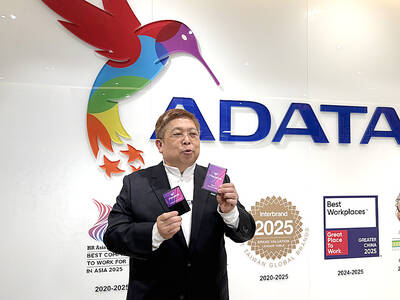
‘SELLER’S MARKET’: Severe chip shortages and price hikes helped Adata’s revenue climb 152% in the first two months, and its forecasts ‘tremendous growth’ this year DRAM module supplier Adata Technology Co (威剛科技) expects memory chip supply constraints to persist through next year, further supporting a price uptrend in DRAM and NAND flash memory, company chairman Simon Chen (陳立白) said yesterday.“We have been winning back former customers and secured new customer
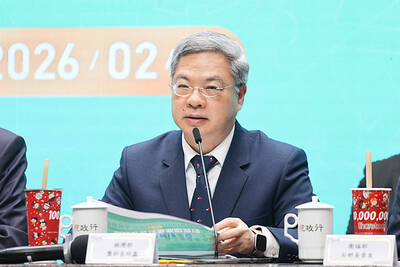
Taiwan has enough crude oil reserves for more than 100 days and sufficient natural gas reserves for more than 11 days, both above the regulatory safety requirement, Minister of Economic Affairs Kung Ming-hsin (龔明鑫) said yesterday, adding that the government would prioritize domestic price stability
After “Operation Absolute Resolve” to capture former Venezuelan president Nicolas Maduro, the US joined Israel on Saturday last week in launching “Operation Epic Fury” to remove Iranian supreme leader Ayatollah Ali Khamenei and his theocratic regime leadership team. The two blitzes are widely believ
In a report released on Feb. 26, US think tank the Center for a New American Security asserted that Taiwan could deploy large numbers of drones and other uncrewed systems, in combination with conventional weapons, to create a “hellscape” scenario for Chinese forces attempting to cross the Taiwan Str
A recent survey on academic pressure among junior-high students found that 44 percent sleep less than eight hours per day. More than half consider themselves to be in a state of moderate to severe fatigue, citing leaving the house early and returning late, frequent examinations and insufficient slee

STRATEGY: Taiwan should be wary of overinvesting in their game against Japan, which could jeopardize two must-win games in Pool C, a commentator said Taiwan face an uphill battle to make it to the World Baseball Classic (WBC) quarter-finals after yesterday losing their Pool C opener to Australia 3-0 at the Tokyo Dome.Despite a stellar start on the mound, Taiwan were stifled by Australian pitching and suffered the sudden departure of captain Chen
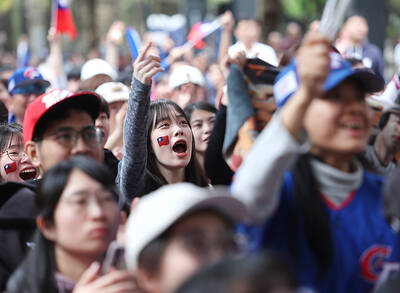
At least 500 fans yesterday gathered in Taipei’s Xinyi District to watch a live broadcast of Taiwan’s Pool C opener against Australia at the World Baseball Classic (WBC).“Team Taiwan, go, go, go,” fans cheered as they watched the game on a large screen at a plaza in Xinyi. Many were waving national
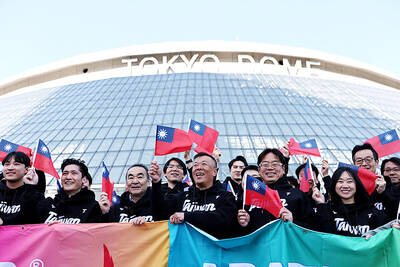
Thousands of Taiwanese fans yesterday descended on the Tokyo Dome for the World Baseball Classic (WBC) opener, displaying banners proclaiming “Team Taiwan” as opposed to their official designation in the tournament, Chinese Taipei.Taiwan has long competed in international sport as “Chinese Taipei” t

Aaron Judge on Wednesday crushed a 453-foot (165.5m) solo homer in the first inning of the US’ exhibition game against the Colorado Rockies, with the US captain drawing a roar from the crowd followed by “U-S-A” chants in a packed ballpark at Salt River Fields.Judge’s no-doubter to left field off sou
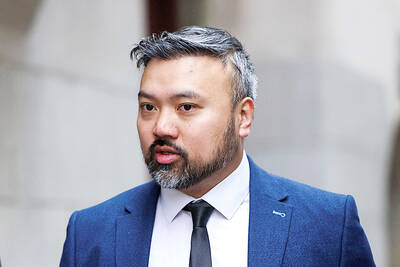
BILL AND PETER: Two China-UK nationals are accused of targeting Hong Kong dissidents on behalf of a foreign intelligence service, prosecutors told the Old Bailey Two men on Wednesday went on trial in London, accused by British prosecutors of spying on Hong Kong pro-democracy dissidents based in the UK on behalf of the territory’s authorities and, ultimately, China.Hong Kong was under British rule for 156 years before reverting to Chinese sovereignty in 1997,
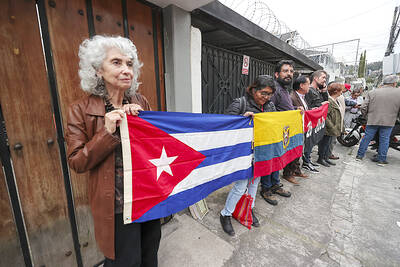
‘UNRELIABLE GRID’: The US embassy in Cuba warned people in the nation to ‘prepare for significant disruptions,’ and conserve fuel, water, food and batteries A blackout on Wednesday left millions of people without power in Havana and the rest of western Cuba in the latest outage in the nation, which is struggling with dwindling oil reserves and a crumbling electricity grid.Cuban government radio station Radio Rebelde quoted an energy official as saying t

Aaron Spencer, an Arkansas man accused of killing his teenage daughter’s alleged abuser, won the Republican nomination for local sheriff while waiting to stand trial for murder in his rural county, where he ran on a message of seeing the failures of law enforcement.Spencer defeated Lonoke County She
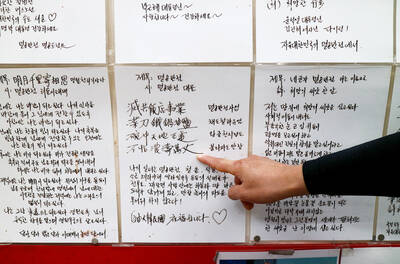
“M yeolgong jajangmyeon (anti-communism zhajiangmian, 滅共炸醬麵), let’s all shout together — myeolgong!” a chef at a Chinese restaurant in Dongtan, located about 35km south of Seoul, South Korea, calls out before serving a bowl of Korean-style zhajiangmian —black bean noodles. Diners repeat the phrase b

The blockbuster GLP-1 drugs that have reshaped the treatment of diabetes and obesity may help prevent multiple substance use disorders — and reduce the tragic outcomes they cause, a large new study finds.An analysis published Wednesday in a medical journal looked at electronic health records from mo

Jessica Chastain takes on one of her most daring roles in Dreams, a torrid erotic thriller about power, obsession, art and immigration. Re-teaming with filmmaker Michel Franco (Memory), she plays a San Francisco socialite entangled in a tempestuous affair with a talented Mexican ballet dancer, playe

A: As the Oscars are about to shine next weekend, several nominees are set to be released in Taiwan — such as “Hamnet,” with eight nominations.B: The movies that I most want to see this year are “Michael,” “The Devil Wears Prada 2” and “Star Wars: The Mandalorian and Grogu.”A: Other hit movies inclu

A: The Oscars are set to take place next weekend. It’s a pity that the Taiwanese film “Left-handed Girl” got snubbed.B: And this year, the horror film “Sinners” broke the all-time record with 16 nominations, followed by “One Battle After Another” with 13 nods. Both are nominated for Best Picture.A:

Every February, the US observes Black History Month, a time dedicated to recognizing the contributions, experiences, and achievements of African Americans. The tradition began in 1926, when historian Carter G. Woodson proposed a national week to promote the teaching of Black history in schools. He d

Two moves show Taichung Mayor Lu Shiow-yen (盧秀燕) is gunning for Chinese Nationalist Party (KMT) party chair and the 2028 presidential election. Technically, these are not yet “officially” official, but by the rules of Taiwan politics, she is now on the dance floor. Earlier this month Lu confirmed in an interview in Japan’s Nikkei that she was considering running for KMT chair. This is not new news, but according to reports from her camp she previously was still considering the case for and against running. By choosing a respected, international news outlet, she declared it to the world. While the outside world likely paid little attention, domestically the message was unmistakable: She is moving on to a larger stage. Part of the dance is to leave options open before formally committing, and with the chair race due in late September, she has time. If something goes wrong in the meantime, or if power brokers in the party offer her a deal that provides more benefits than taking on the role of chair, she can pivot accordingly. Earlier this year, I suggested that strategically, she would be better off concentrating on her job as Taichung mayor until she is term-limited out of office in December next year. Taichung mayor is obviously a full-time job, and concurrently running the Taipei-headquartered party runs the risk of doing one or both jobs poorly and making mistakes that could imperil her shot at the presidency in 2028. The situation has changed. Current KMT Chairman Eric Chu (朱立倫), knowing he is likely to face challengers of a higher caliber than the three relative nobodies already declared, has gone all in on appealing to the base. The base is more likely to turn out to vote in the chair election, so this makes some strategic sense in the short term.

Among Thailand’s Chinese Nationalist Party (KMT) villages, a certain rivalry exists between Arunothai, the largest of these villages, and Mae Salong, which is currently the most prosperous. Historically, the rivalry stems from a split in KMT military factions in the early 1960s, which divided command and opium territories after Chiang Kai-shek (蔣介石) cut off open support in 1961 due to international pressure (see part two, “The KMT opium lords of the Golden Triangle,” on May 20). But today this rivalry manifests as a different kind of split, with Arunothai leading a pro-China faction and Mae Salong staunchly aligned to Taiwan. Last spring at Arunothai’s Jiaolian School, principal Wang Mingming (王明明) had forewarned me of the division between villages, saying, “We are not like the people in Mae Salong. They are rich. Because of the Taiwanese.” Arunothai has in recent years become split in its loyalties between Taiwan and China (see part one, “A tale of two schools,” on May 15), but in Mae Salong, links to Taiwan remain strong. Taiwan-funded monuments pay homage to the Lost Army, villagers wear T-shirts emblazoned with the Republic of China (ROC) flag and tea plantations grown Taiwan’s most famous tea varieties, including Dong Ding (“frozen peak”) Oolong, Oriental Beauty and Jin Xuan (Golden Daylily or Milk Oolong). Even the numerical classifications of the teas — Oolong No. 12 or No. 17, for example — are the same, and the shops resemble those found on Alishan. At the tomb of General Tuan Hsi-wen (段希文) — perched on a Mae Salong hilltop with a view of his ancestral homeland in China’s Yunnan province — a third generation villager wearing a vintage KMT army uniform, Yan Si-Chung (岩思中), greets visitors with sharp military salutes. “Both my father and my grandfather were soldiers in the KMT army,” the 44-year-old
| New Taipei City | 27-28 | 20% | |
| Hsinchu County | 26-27 | 10% | |
| Hsinchu City | 26-27 | 10% | |
| Taipei City | 27-28 | 20% | |
| Miaoli County | 24-26 | 10% | |
| Taoyuan City | 26-27 | 10% | |
| Keelung City | 27-28 | 20% |
| Yunlin County | 26-27 | 10% | |
| Taichung City | 26-28 | 10% | |
| Nantou County | 25-26 | 10% | |
| Changhua County | 27-28 | 10% |
| Chiayi County | 26-27 | 10% | |
| Chiayi City | 25-27 | 10% | |
| Tainan City | 27-28 | 10% | |
| Kaohsiung City | 27-28 | 10% | |
| Pingtung County | 26-27 | 10% |
| Yilan County | 25-26 | 30% | |
| Hualien County | 25-26 | 30% | |
| Taitung County | 25-27 | 30% |
| Kinmen County | 27-28 | 10% | |
| Penghu County | 27-27 | 20% | |
| Lienchiang County | 27-28 | 20% |